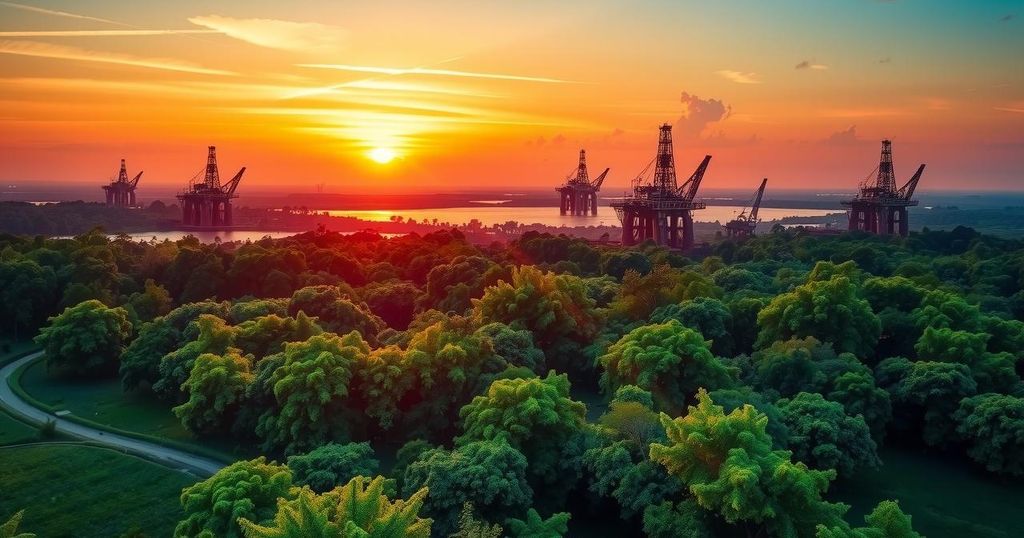World news
ABOP, AFP, ALLIANCE, AMERICAS, ASIA, BOUTERSE, CHINA, DEMOCRACY, DES, DESI BOUTERSE, ELECTION, GENERAL LIBERATION, GENERAL LIBERATION AND DEVELOPMENT PARTY, GOVERNANCE, GOVERNMENT, MEXICO, NATIONAL DEMOCRATIC PARTY, NDP, NORTH AMERICA, PARAMARIBO, PROGRESSIVE REFORM PARTY, RONNIE BRUNSWIJK, SANTOKHI, SOUTH AMERICA, SURINAME, TOTALENERGIES, VHP
Stella Nguyen
0 Comments
Suriname Votes to Direct Prospective Oil Wealth in Key Elections
Suriname held parliamentary elections on Sunday that will determine the management of the nation’s emerging oil wealth. Voters will choose from 14 parties, with incumbent President Chan Santokhi eligible for re-election amid economic challenges. Recent offshore oil discoveries promise significant revenue, and the election outcomes may influence the direction of Suriname’s economic future.
Voting commenced on Sunday in Suriname, where citizens are participating in parliamentary elections that hold the promise of a significant change in the nation’s economic landscape. The results will determine which political group will manage the projected oil windfall from recent discoveries, potentially guiding the smallest South American country from poverty towards prosperity.
Suriname, the sole nation in the Americas that recognizes Dutch as its official language, grapples with steep national debt and soaring inflation, impacting nearly 20% of its 600,000 residents. However, the new offshore oil discoveries could usher in transformative economic conditions. “It will be a huge amount of income for the country,” stated incumbent President Chan Santokhi in an interview, adding, “We are now able to do more for our people so that everyone can be part of the growth of the nation.”
As of Sunday, Surinamese voters are selecting 51 members of parliament, who will soon elect a president and vice-president to lead for a five-year term. Though President Santokhi is constitutionally eligible for re-election, the current political climate lacks a clear frontrunner, making predictions difficult for pollsters.
Defence Minister Krishna Matheora articulated the importance of the elections, asserting the need for Santokhi’s Progressive Reform Party (VHP) to secure victory to continue promoting economic stability. “We have laid the foundations for economic stability and we need to build on that,” he remarked after casting his vote early in the day.
Whoever emerges victorious will inherit the unique opportunity to shift Suriname’s financial future positively, as experts predict significant revenues stemming from offshore oil deposits in the coming decades. Notably, the French energy company TotalEnergies has planned a massive $10.5 billion project aimed at drilling an oil field offshore, with production expected to begin in 2028 at a capacity of 220,000 barrels a day.
In preparation for the possible influx of funds, the government has initiated the “Royalties for Everyone” scheme, which aims to allocate a portion of the oil revenues directly to the citizens.
The parliamentary election features 14 political parties, including Santokhi’s VHP and the leftist National Democratic Party (NDP), previously led by Desi Bouterse, a controversial figure in Suriname’s political history. The center-left General Liberation and Development Party (ABOP), represented by current Vice President Ronnie Brunswijk, is also in contention.
Provisional results from the elections are expected later on Sunday. Suriname is on the verge of commemorating its 50th independence anniversary from Dutch colonization in November this year. Following its independence, Suriname has increasingly aligned itself with China, becoming an early participant in the Belt and Road initiative in 2019, which has heightened its political and commercial ties with the Asian power.
Moreover, U.S. Secretary of State Marco Rubio recently visited Suriname as part of a tour intended to diminish Chinese influence in the region. Remarkably, Suriname is predominantly forested and is one of the few countries in the world boasting a negative carbon footprint.
In light of the impending oil wealth, President Santokhi emphasized the importance of sustainable practices, asserting that the oil windfall could support a transition to greener energy sources. He cautioned about the finite nature of fossil fuels, reminding that “it will be gone after 40 years.”
The Surinamese elections mark a pivotal moment for the nation, with potential economic windfalls from oil discoveries promising transformative change. The future government will play a crucial role in managing these resources to combat poverty and bolster economic growth. As Suriname stands on the cusp of a new era, emphasis on sustainable development will be vital to navigate the implications of this newfound wealth, especially regarding environmental considerations.
Original Source: www.rfi.fr




Post Comment